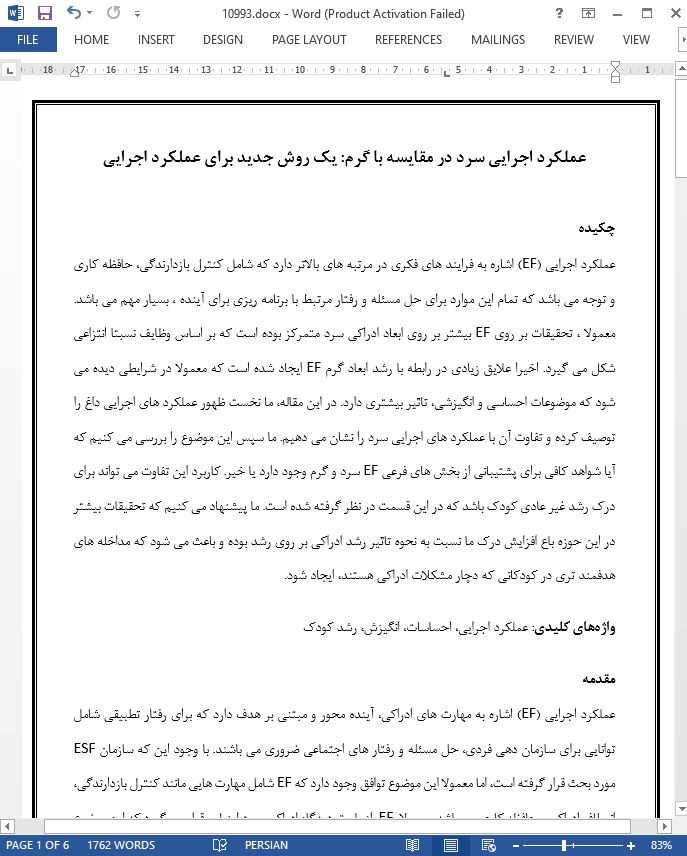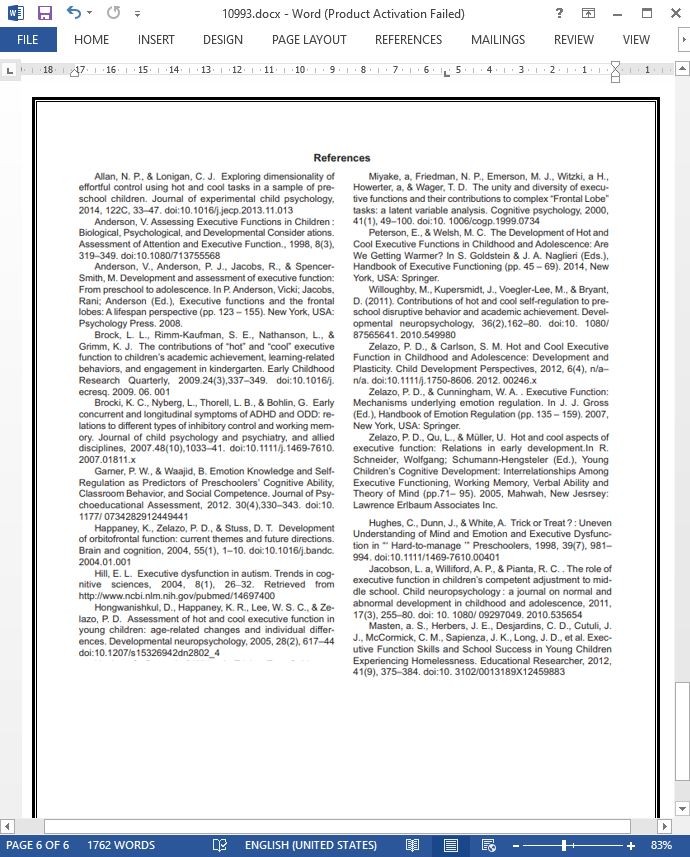
عملکرد اجرایی سرد در مقایسه با گرم: یک روش جدید برای عملکرد اجرایی
چکیده
عملکرد اجرایی (EF) اشاره به فرایند های فکری در مرتبه های بالاتر دارد که شامل کنترل بازدارندگی، حافظه کاری و توجه می باشد که تمام این موارد برای حل مسئله و رفتار مرتبط با برنامه ریزی برای آینده ، بسیار مهم می باشد. معمولا ، تحقیقات بر روی EF بیشتر بر روی ابعاد ادراکی سرد متمرکز بوده است که بر اساس وظایف نسبتا انتزاعی شکل می گیرد. اخیرا علایق زیادی در رابطه با رشد ابعاد گرم EF ایجاد شده است که معمولا در شرایطی دیده می شود که موضوعات احساسی و انگیزشی، تاثیر بیشتری دارد. در این مقاله، ما نخست ظهور عملکرد های اجرایی داغ را توصیف کرده و تفاوت آن با عملکرد های اجرایی سرد را نشان می دهیم. ما سپس این موضوع را بررسی می کنیم که آیا شواهد کافی برای پشتیبانی از بخش های فرعی EF سرد و گرم وجود دارد یا خیر. کاربرد این تفاوت می تواند برای درک رشد غیر عادی کودک باشد که در این قسمت در نظر گرفته شده است. ما پیشنهاد می کنیم که تحقیقات بیشتر در این حوزه باع افزایش درک ما نسبت به نحوه تاثیر رشد ادراکی بر روی رشد بوده و باعث می شود که مداخله های هدفمند تری در کودکانی که دچار مشکلات ادراکی هستند، ایجاد شود.
مقدمه
عملکرد اجرایی (EF) اشاره به مهارت های ادراکی، آینده محور و مبتنی بر هدف دارد که برای رفتار تطبیقی شامل توانایی برای سازمان دهی فردی، حل مسئله و رفتار های اجتماعی ضروری می باشند. با وجود این که سازمان ESF مورد بحث قرار گرفته است، اما معمولا این موضوع توافق وجود دارد که EF شامل مهارت هایی مانند کنترل بازدارندگی، انعطاف ادراکی و حافظه کاری می باشد. معمولا، EF از طریق دیدگاه ادراکی مورد ارزیابی قرار می گیرد که این موضوع نشان دهنده نقش احساسات و انگیزه های موجود در EF می باشد که تا حد زیادی مورد غفلت قرار گرفته است. در واقع، دیدگاه ها، نظریات و ارزیابی های انجام شده بر روی EF به صورت تاریخی تنها بر روی مهارت های ادراکی تمرکز داشته است که این مووضع معمولا تحت شرایط انتزاعی، بدون زمینه مشخص و غیر موثر بوده است. در طول دهه اخیر، یک علاقه رو به افزایش در رابطه با نقش انگیزه و تاثیر بر روی EF وجود داشته است که این موضوع باعث می شود که محقق ها توجه ویژه ای به نقش EF از نظر شرایط احساسی و اجتماعی داشته باشند. این مفهوم سازی گسترده از EF کاربرد های زیادی برای تحقیقات در رابطه با رشد کودکان دارد زیر EF یک عامل پیش بینی قوی از آمادگی برای مدرسه، دستاورد های تحصیلی و رفتار اجتماعی می باشد.
Abstract
Executive function (EF) refers to the higher order thought processes, including inhibitory control, working memory, and attention considered essential to problemsolving and future oriented behaviour. Traditionally, research on EF has focused on cool cognitive aspects, elicited by relatively abstract tasks. More recently there has been growing interest in the development of hot aspects of EF, seen in situations that are emotionally and motivationally significant. In this paper, we first describe the emergence of hot executive function and its distinction to cool executive function. We then examine whether there is enough evidence to support distinct cool and hot EF subcomponents. The implications of how this distinction can be used to make sense of abnormal child development are also considered. We propose that more research in this area will increase understanding of how cognitive development affects development and inform more targeted interventions in children with behavioural difficulties.
Introduction
Executive Function (EF) refers to a set of goal-directed, future-orientated cognitive skills that are essential for adaptive behaviour, including the ability to organise oneself, problem solve and social behaviour (Anderson, 1998). Although the organisation of EF is debated, it is generally agreed that EF encompasses skills such as inhibitory control, cognitive flexibility and working memory (Miyake et al., 2000). Traditionally EF has been viewed through a purely cognitive lens, meaning the role of emotion and motivation in EF has largely been neglected. Indeed, perspectives, theories and assessments of EF have historically focussed on purely cognitive skills that are elicited under relatively abstract, decontextualized, non-affective conditions (Peterson & Welsh, 2014). Over the past decade, there has been a rising interest in the role of motivation and affect in EF, leading researchers to pay greater attention to the role of EF in emotionally charged and social situations. This broader conceptualisation of EF has important implications for research into child development because EF has been found to be a strong predictor of school readiness, academic achievement and social behaviour (Brock, Rimm-Kaufman, Nathanson, & Grimm, 2009; Jacobson, Williford, & Pianta, 2011).
چکیده
مقدمه
ظهور عملکرد اجرایی گرم
آیا برای ساختار های مستقل EF سرد و گرم، پشتیبانی وجود دارد؟
جمع بندی و جهت های تحقیقاتی آتی
Abstract
Introduction
The Emergence of Hot Executive Function
Is there Support for Independent Cool and Hot EF Constructs
Conclusions and Future Directions
- اصل مقاله انگلیسی با فرمت ورد (word) با قابلیت ویرایش
- ترجمه فارسی مقاله با فرمت ورد (word) با قابلیت ویرایش، بدون آرم سایت ای ترجمه
- ترجمه فارسی مقاله با فرمت pdf، بدون آرم سایت ای ترجمه


